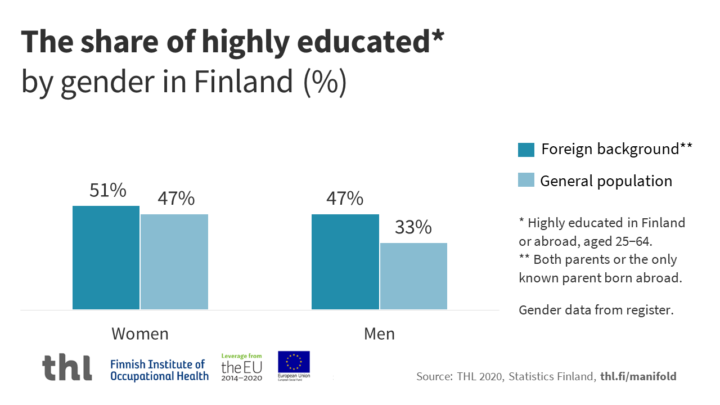The following five myths belittle and exclude “immigrant women” from Finnish society and working life. To celebrate International Women’s Day, this year themed Break the Bias, The Manifold More -project fact-checked these myths.
Myth 1: “Immigrant women” are uneducated housewives
More than 50 percent of foreign origin women in Finland have a higher education (see infograph). Foreign origin women are highly educated more often than foreign origin men. Foreign origin women and men have a higher education more often than the general population in Finland.

The “immigrant woman” is seldom illiterate, although differences between population groups exist. For example, approximately one in ten Somali and Kurdish origin women reads poorly or not at all.
More than half of “immigrant women” are working. The employment rate for women with foreign background is, however, lower compared to other groups in the population. Every fifth woman with foreign background is on family leave, which is a bigger proportion than among the general population in Finland.
Myth 2: “Immigrant women” do not want to work full-time
One in four women with foreign origin work part-time. Working part-time is far more common as compared to other groups in the population.
The most common reason for working part-time is that a full-time job was not available. By contrast, caring for one’s children was the reason for working part-time for only 14% of women with a foreign background.
Returning to work after having a child is slower among women with a foreign background compared to Finnish women. Immigrant mothers are less likely to have a job to return to after parental leave.
Myth 3: “Immigrant women” want to do care work
Women of foreign origin have relatively more degrees in engineering and significantly fewer in health and social work than women of Finnish origin.
Education completed abroad by foreign background population is less segregated by gender than the fields of education in Finland. In contrast, degrees completed in Finland appear to reinforce the segregation to some extent. This indicates that vocational guidance counselling in Finland reinforces a strong segregation of education and working life.
“Immigrant women” are overrepresented in certain occupational groups. Of women working as cleaners 17% were of foreign background, while of all employed women only 5% were of foreign background. Similarly, of industrial and construction assistants 14% and of kitchen and catering assistants 10% were women of foreign background.
It is known that women with foreign background do not progress to jobs corresponding to their higher education, even if they have a degree in Finland and at least advanced language skills. More than one in three highly educated women with foreign background is overqualified for their current jobs, compared to every fifth Finnish-born woman.
Myth 4: “Immigrant women” integrate poorly
Finnish or Swedish language skills are often seen as central to integration. One third of women with foreign background consider their Finnish or Swedish to be excellent. Women rate their Finnish or Swedish language skills better than men with a foreign background.
Friendships are also an indicator of integration. The longer a person has lived in Finland, the more likely they have at least one Finnish friend. Of foreign background persons who have lived in Finland for at least 11 years 94% have Finnish friends. Only 78% of those who have lived in Finland for less than five years have at least one Finnish friend.
There are gender differences in friendships. For example, almost two thirds of Somali origin men had a good friend of Finnish origin, compared to fewer than one in four of Somali origin women. In contrast, Kurdish origin women were more likely to have a good friend of Finnish origin than men. Russian origin women and men were equally likely to have friends of Finnish origin.
Myth 5: “Immigrant women” are discriminated victims in working life
Men with a foreign background report more discrimination experiences than women. Both women and men of foreign background experience discrimination in career advancement almost twice as often as the general population. Also, discrimination experiences in recruitment or appointment situations are more common than in the general population.
There are differences in the prevalence of discrimination experiences between countries of origin. Discrimination experiences by coworkers and superiors are most common among persons who have moved to Finland from African countries: almost one in three men and more than one in five women have experienced discrimination by colleagues. Men from Middle Eastern and African backgrounds are particularly likely to have experienced discrimination in recruitment or appointment situations.
There are also differences in the prevalence of discrimination experiences by occupational status. Discrimination related to attitudes and promotion opportunities is notably high (21–23%) among women from foreign backgrounds who work as lower-level employees.
Tools to debunk myths
In the light of the research evidence, there is no single ”immigrant woman” who conforms to the biases. In 2020, of Finland’s population 444 031 persons, or 8 percent, was of foreign background. Half of them are women. They do not form a homogeneous group but differ from each other in many ways.
Biases must be broken every day of the year, not only on theme days. These materials and online training courses will help you to continue your work for equality and non-discrimination:
- Gender equality and equity – Why and how? (eOppiva training, in Finnish)
- Diverse working life: Information and tools for public administrations (eOppiva training, in Finnish)
- How to promote diversity in recruitment? (Finnish Institute of Occupational Health)
- Everyday anti-racist acts (Equality.fi)
The Manifold More project challenges stereotypes about immigrant women through research and expert communication. You can follow the project on Twitter @moninaisesti. The Manifold More project (2019-2022) is funded by the European Social Fund (ESF).
Read more:
Manifold More -project (Thl.fi)
Dismantling segregation – tools for a more equal working life -project (Thl.fi)
Does gender matter in corporate management? – Five myths about leadership (Thl.fi, in Finnish)
Infographics on gender equality in economic and political decision-making (Thl.fi)
Overcoming glass ceilings and sticky floors – promoting diversity through recruitment (Thl.fi)
Survey on Well-Being among Foreign Born Population (FinMonik, Abstract in English)
Survey on Work and Wellbeing among Persons of Foreign Origin (UTH, in Finnish)
Migrant Health and Wellbeing Survey (Maamu, Multiple languages)
